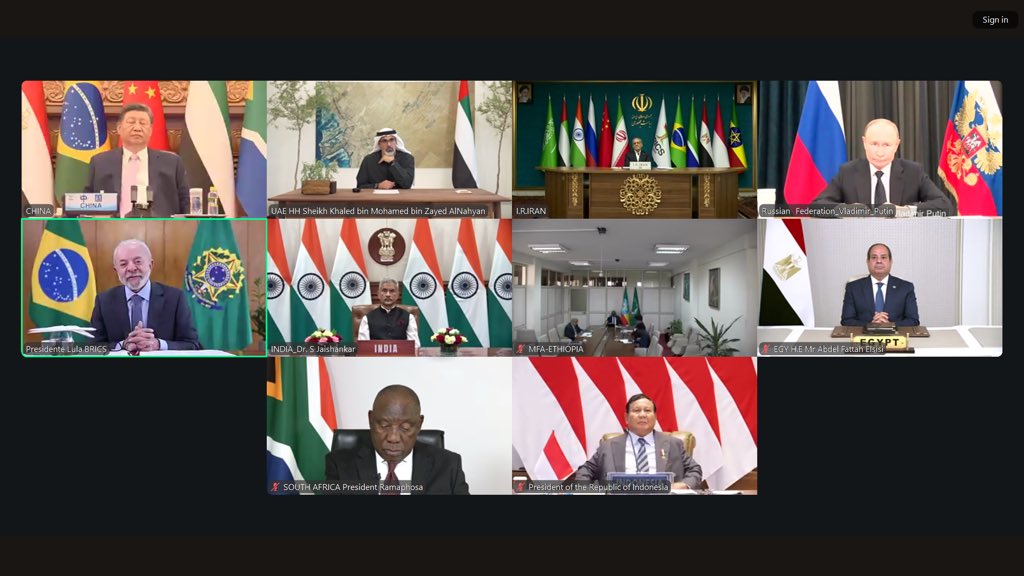India Calls for Urgent UN Reform, Condemns Trade Weaponisation at BRICS Summit
At a significant moment of geopolitical flux, India’s External Affairs Minister S. Jaishankar used the platform of the BRICS Leaders’ Virtual Summit to issue a sharp indictment of the global governance system, urging urgent reform of the United Nations and its Security Council, while forcefully condemning the weaponisation of trade and selective sanctions regimes.
 |
| Image Source: EAM Jaishankar |
Multilateral System ‘Failing the World’
In his remarks, Jaishankar said the multilateral framework was being tested like never before, citing the pandemic’s aftermath, armed conflicts in Ukraine and West Asia, extreme climate events, and a perceptible slowdown in the global Sustainable Development Goals (SDGs) agenda.
Without naming specific states, Jaishankar took aim at the gridlock in global decision-making, asserting that reform of the UN and particularly the Security Council is “not only long overdue but essential for global credibility.”
“The working of international organizations in the last few years has witnessed major shortfalls… gridlocks have undermined the search for common ground,” he said, urging BRICS to be “a strong collective voice for much awaited change.”
India has consistently demanded that the UN Security Council reflect 21st-century realities, especially by expanding permanent representation to include voices from the Global South, including Africa, Latin America, and South Asia.
Global South Needs More Than Rhetoric
Highlighting the disproportionate economic and humanitarian fallout borne by developing nations, Jaishankar said the Global South continues to suffer the most from rising energy, food, and fertilizer insecurity -- a crisis he linked directly to conflicts and targeted sanctions regimes.
He warned that when shipping lanes are targeted, the economic pain goes beyond trade, impacting livelihoods in poorer nations. “Selective protection,” he said, “cannot be a global answer.”
These remarks come amid mounting criticism in the developing world over Western sanctions targeting Russia and others, seen by many in the Global South as escalating economic hardship while failing to resolve geopolitical crises.
Subtle Rebuke of U.S. Tariff Regime
In a clear reference to recent protectionist measures by the United States under Donald Trump’s administration, Jaishankar denounced the weaponisation of trade tools for non-economic objectives.
“Increasing barriers and complicating transactions will not help. Neither would the linking of trade measures to non-trade matters,” he said.
My remarks at the virtual BRICS Summit.
— Dr. S. Jaishankar (@DrSJaishankar) September 8, 2025
https://t.co/iWTMWIeQg5
He flagged disruptions in global supply chains and urged structural reforms that would make the global economy more resilient — a phrase widely interpreted as an implicit critique of Trump’s aggressive tariff policies on multiple partners, including India and China.
Jaishankar advocated for shorter, diversified, and shock-proof supply chains, while calling for a democratisation of manufacturing and production across geographies -- positioning it as a solution to supply disruptions and overdependence on a few economies.
Address Internal Trade Imbalances
Turning inward, Jaishankar also called on BRICS members to examine imbalances within the bloc itself, stating that India continues to face significant trade deficits with several BRICS partners.
He urged the group to review internal trade flows and commit to fairer terms that reflect mutual interests.
Climate and Development Also on the Agenda
While focusing sharply on systemic reform and geopolitical disruptions, India did not lose sight of sustainable development and climate action.
Jaishankar warned that both climate action and climate justice are slipping in global priorities, and called for renewed global attention to South-led initiatives such as: International Solar Alliance (ISA), Coalition for Disaster Resilient Infrastructure (CDRI), and Global Biofuels Alliance
India Positions Itself as Voice of Stability
India’s sharp interventions at the BRICS forum come amid deepening fault lines between the West and the Global South, a new wave of geoeconomic realignments, and growing recognition that the existing global order is out of step with emerging realities.
As tensions between the U.S., China, Russia, and Europe continue to shape global policymaking, India has increasingly positioned itself as a non-aligned stabiliser, pushing for equity, representation, and sustainable diplomacy.
With the BRICS expanding in scope and ambition, India's emphasis on rules-based multilateralism, fair trade, and reform aims to ensure that platforms like BRICS don’t become mirror images of the inequities they seek to challenge.
